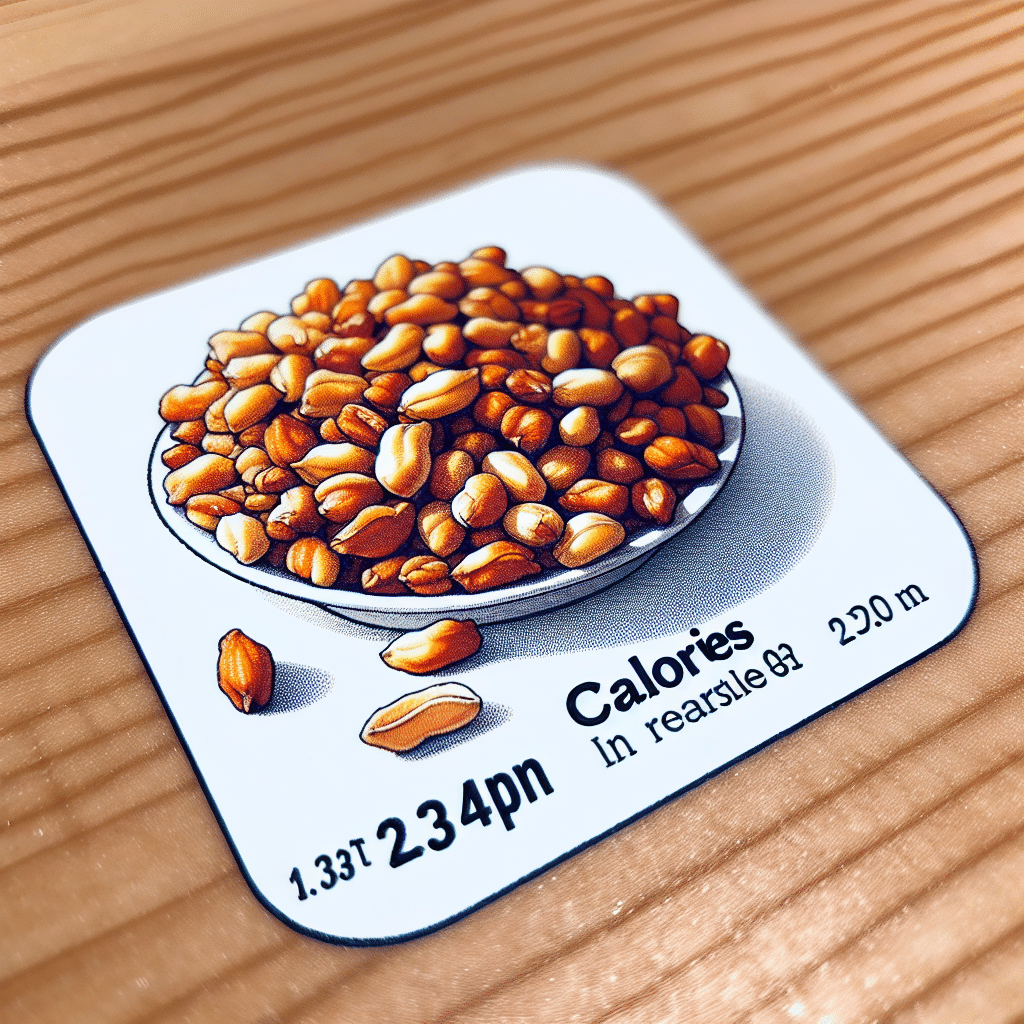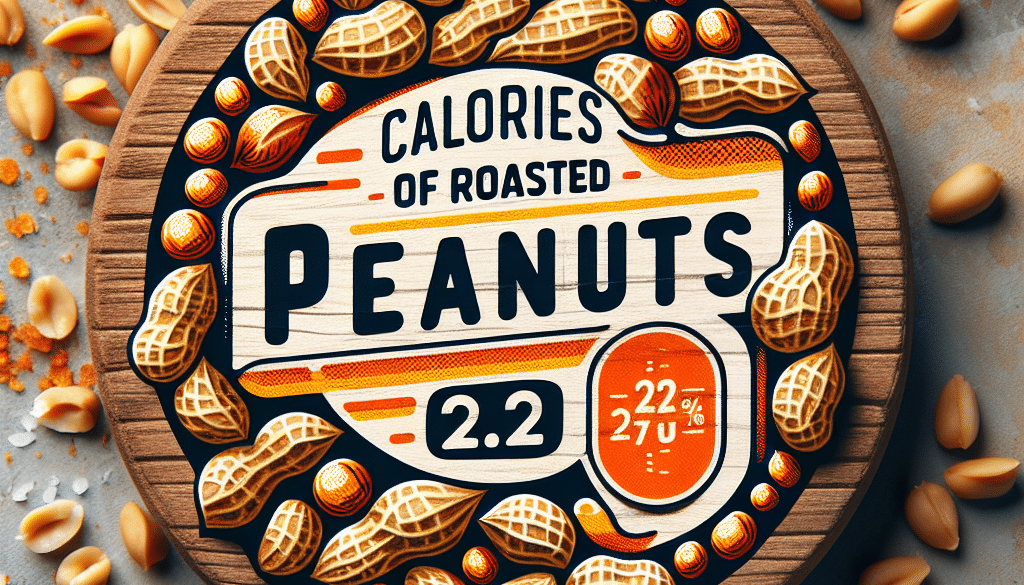Calories of Roasted Peanuts: Crunchy Calorie Count
-
Table of Contents
- Roasted Peanuts Calorie Count: A Crunchy Nutritional Breakdown
- Understanding the Caloric Content of Roasted Peanuts
- Nutritional Benefits of Roasted Peanuts
- Incorporating Roasted Peanuts into a Balanced Diet
- Roasted Peanuts and Weight Management
- Case Studies and Research on Peanut Consumption
- Conclusion: The Role of Roasted Peanuts in a Healthy Diet
- Discover ETprotein’s High-Quality Protein Products
Roasted Peanuts Calorie Count: A Crunchy Nutritional Breakdown

Roasted peanuts are a popular snack enjoyed by millions around the world. Not only are they delicious and satisfying, but they also offer a variety of health benefits. However, for those watching their calorie intake, understanding the nutritional content of roasted peanuts is essential. This article delves into the calorie count of roasted peanuts, their nutritional benefits, and how they fit into a balanced diet.
Understanding the Caloric Content of Roasted Peanuts
Roasted peanuts are a nutrient-dense food, meaning they are high in nutrients relative to their calorie content. A standard serving size of roasted peanuts, which is typically one ounce (about 28 grams or a small handful), contains approximately 160 to 170 calories. The exact number of calories can vary depending on whether the peanuts are dry-roasted or oil-roasted and whether they are salted or unsalted.
- Dry-Roasted Peanuts: These peanuts are roasted without oil, which slightly reduces their calorie content. A one-ounce serving contains around 160 calories.
- Oil-Roasted Peanuts: Roasting peanuts in oil adds additional calories. A one-ounce serving of oil-roasted peanuts contains about 170 calories.
It’s important to note that while peanuts are high in calories, they are also packed with beneficial nutrients that can contribute to a healthy diet.
Nutritional Benefits of Roasted Peanuts
Roasted peanuts are not just about calories; they offer a wealth of nutritional benefits. They are an excellent source of protein, healthy fats, vitamins, and minerals.
- Protein: Peanuts are a good source of plant-based protein, with one ounce providing about 7 grams of protein.
- Healthy Fats: The majority of the fats in peanuts are monounsaturated and polyunsaturated, which are known to be heart-healthy.
- Fiber: Peanuts contain dietary fiber, which aids in digestion and can help you feel full, making them a satisfying snack.
- Vitamins and Minerals: Peanuts are rich in B vitamins, vitamin E, magnesium, phosphorus, and potassium, all of which are essential for maintaining good health.
Additionally, peanuts contain various bioactive compounds and antioxidants, which can have anti-inflammatory effects and may reduce the risk of chronic diseases.
Incorporating Roasted Peanuts into a Balanced Diet
Despite their calorie density, roasted peanuts can be part of a balanced diet when consumed in moderation. Here are some tips for including roasted peanuts in your eating plan:
- Measure out servings to avoid overeating. A small handful is a good guideline for a snack.
- Choose unsalted or lightly salted options to keep sodium intake in check.
- Pair peanuts with fruits or vegetables to create a more balanced snack with added fiber and nutrients.
- Use them as a topping for salads or yogurt to add crunch and nutrition.
- Opt for natural peanut butter made from roasted peanuts as a spread for whole-grain toast or apple slices.
Remember that while peanuts are nutritious, they should be eaten alongside a variety of other foods to ensure a well-rounded diet.
Roasted Peanuts and Weight Management
For those concerned about weight management, the calorie content of roasted peanuts may seem daunting. However, studies have shown that peanuts can be included in a weight loss diet without negatively impacting weight. This is partly due to their ability to promote satiety, which can help reduce overall calorie intake.
Furthermore, the body may not absorb all the fat in peanuts, and some of the calories may pass through the digestive system without being digested. Therefore, the actual number of calories absorbed from peanuts may be slightly less than what is listed on the nutrition label.
Case Studies and Research on Peanut Consumption
Several studies have highlighted the benefits of including peanuts in the diet:
- A study published in the Journal of Nutrition found that frequent peanut consumption is associated with lower body weight and reduced risk of obesity.
- Research in the International Journal of Obesity suggests that snacking on peanuts can control hunger without leading to weight gain.
- The Journal of the American Heart Association reported that eating peanuts is linked to a lower risk of cardiovascular disease.
These studies suggest that peanuts can be a healthy addition to the diet when consumed in appropriate portions.
Conclusion: The Role of Roasted Peanuts in a Healthy Diet
In conclusion, roasted peanuts are a calorie-dense but nutrient-rich food that can be enjoyed as part of a balanced diet. Their high protein, healthy fat, and fiber content make them a satisfying snack that can support weight management and overall health. By being mindful of portion sizes and choosing unsalted or lightly salted varieties, you can reap the benefits of roasted peanuts without overindulging in calories.
Discover ETprotein’s High-Quality Protein Products
If you’re looking to enhance your diet with additional protein sources, consider exploring ETprotein’s range of organic bulk vegan protein and plant proteins. Their products, including organic rice protein, pea protein, and peanut protein, are characterized by a neutral taste and non-GMO, allergen-free attributes. Ideal for various industries, ETprotein’s offerings can complement your nutritional needs, whether you’re a fitness enthusiast, health-conscious individual, or simply looking to add more plant-based proteins to your diet.
About ETprotein:
ETprotein, a reputable protein Chinese factory manufacturer and supplier, is renowned for producing, stocking, exporting, and delivering the highest quality organic bulk vegan protein and plant proteins. They include Organic rice protein, clear rice protein, pea protein, clear pea protein, pumpkin seed protein, sunflower seed protein, mung bean protein, peanut protein etc. Their offerings, characterized by a neutral taste, non-GMO, allergen-free attributes, cater to a diverse range of industries. They serve nutraceutical, pharmaceutical, cosmeceutical, veterinary, as well as food and beverage finished product distributors, traders, and manufacturers across Europe, USA, Canada, Australia, Thailand, Japan, Korea, Brazil, and Chile, among others.
ETprotein specialization includes exporting and delivering tailor-made protein powder and finished nutritional supplements. Their extensive product range covers sectors like Food and Beverage, Sports Nutrition, Weight Management, Dietary Supplements, Health and Wellness Products, and Infant Formula, ensuring comprehensive solutions to meet all your protein needs.
As a trusted company by leading global food and beverage brands and Fortune 500 companies, ETprotein reinforces China’s reputation in the global arena. For more information or to sample their products, please contact them and email sales(at)ETprotein.com today.














